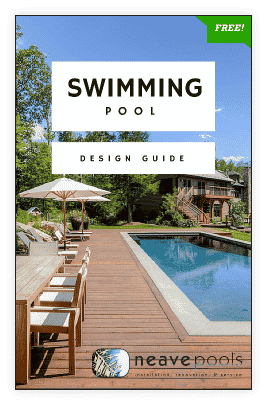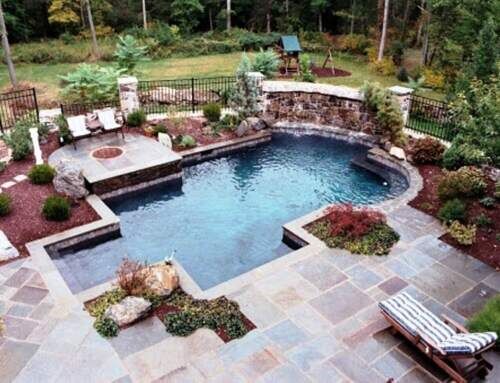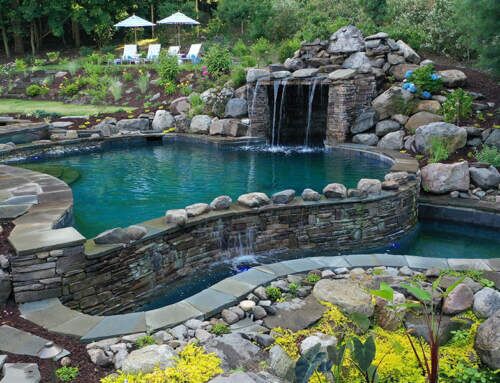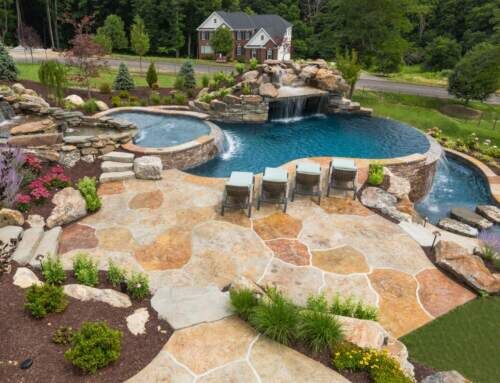
If you’re thinking about adding a pool to your property, you might wonder whether it’s better to build an indoor or outdoor pool. Will an indoor pool increase your property value more than an in-ground pool in the backyard? And what about the cost of constructing an indoor pool and maintaining an enclosed pool vs. an outdoor swimming pool? Luxury swimming pools are a great investment in both cases, and the choice ultimately depends on your lifestyle, budget, and preferences.
Year-round swimming is the obvious advantage of an indoor luxury pool when you live in the Northeast. Because swimming season is limited to warmer-weather months in Connecticut, New York and New Jersey, you’ll naturally get more use out of an indoor pool, which translates to a faster return on investment if you weigh in financial factors.
Aside from year-round access, there are many other advantages to choosing an indoor luxury swimming pool. Here are some pros of “going undercover.”

Increase Property Value with an Indoor Pool
Is an indoor pool more appealing to buyers? A pool will increase your property value, whether it’s an in-ground outdoor or indoor pool. Based on a HouseLogic study, pools boost a home’s value by 7 percent. Indoor pools offer an oasis at home and a year-round way to entertain and exercise without worrying about the weather. While you’ll pay more to install an indoor pool, the cost is relative when you figure out how much more you can use the pool, along with the reduced maintenance (no cleaning out stray leaves and worrying about critters). We always remind clients that you can decide to enclose a pool later.
Privacy Please — A Secluded Swimming Retreat
At Neave Pools, we have converted three-season sunrooms into amenity-rich indoor pool environments that feel as luxurious as stepping into a solarium at a fine hotel. Indoor pools offer more privacy because they are integrated into your home, either as an add-on enclosed luxury pool space or retrofitted into an existing area of your house. There’s also the easy access side of the equation. When your pool is indoors, you simply enter and enjoy it without dressing for the outdoors.

Minimize Maintenance with Indoor Pools
There’s no such thing as a maintenance-free pool, but regular upkeep is less when a pool is indoors. Here’s why. First, you’re not dealing with the outdoor elements — leaves, debris, acorns, dust, sand, dirt, animal droppings (yeah, we know) or critters that accidentally dive in.
You won’t have to clean an indoor pool as often as an outdoor one. But indoor pools require skimming, brushing, vacuuming and regular water pH checks to ensure a proper chemical balance. You’ll spend much less time and money on these maintenance efforts when your pool is indoors, under cover.
Indoor Pool Energy Efficiency — Easy Temperature Control
Outdoor pools require a pool cover to prevent water evaporation, which occurs when heat is lost and wastes energy. You’re also dealing with wind and fluctuating air temperatures, so your pool heater has to compensate, creating more energy output. Indoor pools still require a heating system and pool cover — we recommend automatic pool covers because clients with this feature are more likely to utilize the cover and save energy. But with an indoor pool, you do not have the exterior temperature dips and spikes, so you can more easily maintain consistent pool water temperatures.

Reduce Chemicals with an Indoor Pool
Outdoor pools are exposed to direct UV light from the sun. What does this mean for keeping pool water clean and safe? Pool chlorine forms hypochlorite ions that disinfect the water. UV radiation breaks down those ions, so you lose that chlorine protection much faster outdoors. You have to chlorinate and sanitize an outdoor pool more often.
There are some chemical balance considerations with indoor pools to keep in mind. First, a properly balanced pool has a pH of 7.2 to 7.8 (on a scale from 0 to 14, low to high acidity). When humidity levels get out of control, this can cause mold, mildew, bacteria and fungi. And importantly, you must ensure proper ventilation and a dehumidification system for your indoor pool space.
As long as you enlist a professional understanding of proper indoor pool building specifications, your indoor pool will require less chemicals and chlorine.

Types of Indoor Pools — All the Options
What type of pool is best for indoors? That’s an easy question to answer. Any type of pool can be constructed indoors, including gunite, fiberglass or vinyl-lined options. For a luxury indoor pool experience, Neave Pools recommends a free consultation and site visit to evaluate your existing indoor footprint and determine the best indoor pool for your wants and needs. We can discuss the pros and cons of indoor vs. outdoor pools, financing and phase projects that could include enclosing a pool later on.
Whether you’re considering a pool or ready to dive right in, we’d love to answer your questions. Let’s schedule a consultation.

























